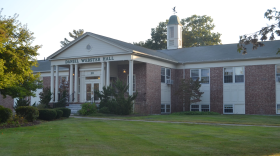About 20 people gathered at the Assembly of God Bethel in Nashua Wednesday night for a presentation about domestic violence organized by the New Hampshire Brazilian Council.
Domestic violence is often underreported, and advocates for New Hampshire’s Brazilian community said they hear from many people who are hesitant to speak up about the issue out of fear that it could lead to issues related to their immigration status. The goal of Wednesday’s program, hosted at a church with many Brazilian parishioners, was to educate people about their rights and where to go for help.
Ana Costa, who is the wife of the pastor at Assembly of God Bethel, said some women have come to her looking for help after their partner hit them. While she felt best equipped to be a listening ear and to offer spiritual guidance, she said she needed more information about how domestic violence cases were handled by the judicial system and what kind of resources were available to help — especially when it came to finding safe housing.
“A lot of them just want to release the stress, but they don’t want to change, so they keep in the same cycle there,” she said.
After this week’s presentation, Costa said she felt more confident in guiding people who come to her for help in the future.
At Wednesday’s presentation, Lisa Dunlap with Bridges, a nonprofit agency that works with people who have experienced domestic and sexual violence, told attendees that people in those situations usually return to an aggressor seven to nine times before leaving them for good. In many cases, she said, those who try to flee domestic violence do not have a place to stay after.
“Financial control is one of the main challenges they face,” she said.
The Nashua Police Department has received around two thousand domestic violence calls this year, according to officers from the domestic violence unit who spoke at Wednesday’s meeting. The officers said their department doesn't ask about immigration status when someone files a domestic violence report.
Those who attended the presentation also learned how to place a restraining order, what the process looks like when someone is convicted of domestic violence and what organizations are available to help survivors.
In her work for Bridges, Dunlap said she’s observed that people in the Brazilian community tend to be more comfortable reaching out for help if they can connect with are more confident in connecting with one person individually instead of reaching the organization/
“They create deep connections with the case workers,” she said.
In addition, Dunlap said Bridges also provides services to adults and children to help them feel more secure and less alone after reporting domestic violence — like accompanying them to court. They also have a cultural advocate specifically focused on working with the local Hispanic community.
Rafaela Aguiar, a psychologist and psychoanalyst, is also trying to break down cultural and language barriers that can make it difficult for people experiencing domestic violence to seek help. She is starting a group to support women in these situations. She plans to conduct the group in Portuguese to give people a safe space to talk.
“I feel we are victims of domestic violence mostly because we don’t know where to go, who to call, and what to do in some cases,” she said.
The New Hampshire Brazilian Council, the organizer of Wednesday’s event, also offers legal advice to people experiencing domestic violence.








